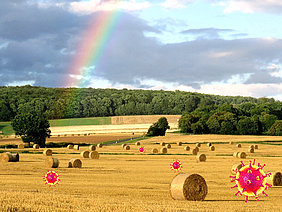The 41st annual conference of the Gesellschaft für Informatik in der Landwirtschaft (GIL) will deal intensively with digitisation in agriculture, forestry and food in times of corona crisis. Which tendencies in the field of digitization are currently gaining particular momentum? Due to the expected distance and hygiene requirements, the GIL Annual Conference 2021 will be held in the form of a broadcast of the plenary session live from the ATB as well as in online sessions.
The current challenges of containing the corona pandemic have unprecedented effects on society and the economy and are also changing many processes in the agricultural, forestry and food sectors. Restricted global trade affects both sales opportunities and the availability of inputs. The availability of seasonal workers is also very restricted and their deployment is difficult to plan. Areas with manual labour-intensive work (e.g. asparagus harvesting, weed control) are hit particularly hard. Changing consumption patterns and hygiene requirements offer both opportunities as well as constraints for business models in the agricultural sector. Innovation is needed to ensure future success.
To what extent can digitisation in the agriculture, forestry and food sector help to cushion the effects of the crisis? Will digital solutions help direct marketing companies to better master the current challenges? To what extent will developments in the field of agricultural robotics and decision support systems gain importance? Is the dynamic development towards digital consulting and training services a model for the future?
The following topics are in focus of the 2021 conference:
- Effects of the Corona pandemic on the opportunities and limitations of innovative ICT business models
- Options of robotics for coping with workload peaks
- Decision support systems to manage complex challenges
- Opportunities and risks of increasing online trading for farmers and consumers
- Role of digitisation in the deglobalisation of value chains
- Contribution of digitization in pandemic times to ensure food safety and reliable food supply
- Approaches and recommendations for future crises
The official conference-website of the GIL annual meeting is now available for registered attendees at https://gil2021.hybrid-avdata.de.
You can participate in all program items of the conference via this website.
Please use your conftool login and password, which you have received after registering for the conference via https://www.conftool.com/gil2021
The conference will conclude with an online panel discussion (in German):
"Agriculture in the (Corona-) crisis - How can digitization offer a way out?"
Time: March 9, 4:00 to 5:30 p.m.
Panel members
- Arno Ruckelshausen - Professor at Hochschule Osnabrück (Faculty of Engineering and Computer Science)
- Anna Henkel - Professorship Sociology with focus on the Sociology of Technology and Sustainable Development, Universität Passau
- Barbara Sturm - Scientific director, Leibniz Institute for Agricultural Engineering and Bioeconomy
- Jörg Migende - Head of Digital Farming at BayWa AG, München
Moderation: Andreas Meyer-Aurich, ATB
Program and further information can be found at gil-net.de
Conference language: German (mainly)
We are looking forward to an exciting conference!
Contact ATB: Dr. Andreas Meyer-Aurich
The main goal of the Gesellschaft für Informatik in der Land-, Forst- und Ernährungswirtschaft (GIL e.V.) is the promotion of agricultural informatics in research, teaching and practice. This concerns the creation, evaluation and dissemination of theories, models, methods, tools and solutions for the analysis, design, application and operation of information systems for agriculture, forestry and food industry. The annual conference as a central meeting point serves to gain and disseminate knowledge. It addresses lecturers, students, users, experts and decision makers in research, teaching, business, administration and politics.

